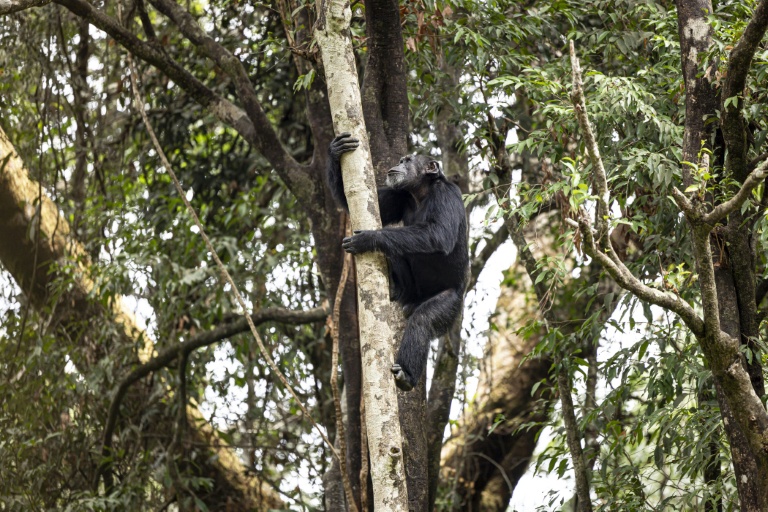Do Chimps Really Drink Alcohol Every Day?

Published: 2025-09-18 01:12:16 | Category: Trump GNEWS Search
This article explores a recent study revealing that chimpanzees consume the equivalent of at least one alcoholic drink per day by eating ripe, fermenting fruit. This discovery supports the idea that humans may have inherited a taste for alcohol and the ability to metabolise it from our primate ancestors.
Last updated: 27 October 2023 (BST)
Key Takeaways
- Chimpanzees consume approximately 14 grams of alcohol daily through fruit.
- The study supports the "drunken monkey theory" about human affinity for alcohol.
- Researchers are investigating the behavioural effects of alcohol on nonhuman primates.
- The findings could reshape our understanding of alcohol consumption in evolutionary terms.
- Further studies are needed to determine if chimpanzees actively seek out fermented fruit.
The Study: An Overview
Conducted in the wilds of Africa, the study provides new insights into the alcohol consumption habits of chimpanzees. Researchers analysed the ethanol content of various fruits that chimpanzees consume. Their findings suggest that these animals regularly ingest significant amounts of alcohol, reinforcing the notion that our relationship with alcohol may be deeply rooted in our evolutionary history.
Understanding the Drunken Monkey Theory
The "drunken monkey theory" proposed by biologist Robert Dudley suggests that the consumption of fermented fruits by primates has influenced human attraction to alcohol. This theory posits that our ancestors enjoyed the intoxicating effects of alcohol, which may have provided certain evolutionary advantages, such as increased social bonding. Maro's research seems to provide empirical support for this long-debated hypothesis.
Evidence from the Study
According to lead author Aleksey Maro, the amount of alcohol consumed by chimpanzees is not negligible. By eating a variety of fruits, they are estimated to take in around 14 grams of alcohol daily. When adjusted for body size, this is comparable to a human drinking a pint of beer each day. This is a significant revelation, as it indicates that alcohol consumption is not merely an anomaly but rather a regular part of chimpanzee diets.
The Methodology Behind the Findings
The researchers collected samples of fruits that are staples in chimpanzee diets and measured their ethanol content. Through this approach, they were able to quantify the levels of alcohol that chimpanzees would likely ingest in the wild. This rigorous methodology adds credibility to their findings, which could have far-reaching implications for understanding alcohol consumption among primates and, by extension, humans.
Comparative Analysis: Chimpanzees vs. Humans
Humans have a well-documented history of alcohol consumption, often linking it to social and cultural practices. The findings from this study suggest that chimpanzees may share this inclination, albeit in a more instinctual manner. The overlap in behaviours raises intriguing questions about the evolutionary pathways that led to our modern relationship with alcohol.
Potential Health Implications
The study also opens the door for discussions surrounding the health implications of alcohol consumption in nonhuman primates. Chronic exposure to low levels of ethanol could have various biological and behavioural consequences, which warrant further investigation. Understanding these effects may help researchers draw parallels with human health, particularly concerning alcohol-related conditions.
Ongoing Research Directions
While the current study adds to our understanding of primate alcohol consumption, many questions remain unanswered. For instance, do chimpanzees actively seek out fermented fruits, or do they consume them opportunistically? Future studies are likely to focus on this aspect, along with the potential benefits and risks associated with regular alcohol consumption in chimpanzees.
Conclusion: What We Can Learn From Chimpanzees
This research provides an interesting lens through which we can examine our behaviours regarding alcohol consumption. By studying chimpanzees, we can gain insights into the evolutionary origins of our relationship with alcohol, which may help inform current discussions on alcohol use and its effects on human health. The findings encourage us to reflect on the evolutionary factors that contribute to our behaviours and preferences in the modern world.
FAQs
What is the drunken monkey theory?
The drunken monkey theory suggests that humans inherited a taste for alcohol from our primate ancestors, who consumed fermented fruits regularly. This behaviour may have evolutionary benefits related to social bonding.
How much alcohol do chimpanzees consume daily?
Chimpanzees are estimated to consume around 14 grams of alcohol each day through their diet of ripe, fermenting fruit, which is comparable to a human drinking a pint of beer.
What are the potential health effects of alcohol on chimpanzees?
The chronic consumption of low levels of ethanol may have various biological and behavioural consequences for chimpanzees. Ongoing research aims to explore these effects further.
Are chimpanzees actively seeking out alcoholic fruit?
The current study does not provide a definitive answer to whether chimpanzees actively seek out fermented fruit or consume it opportunistically when found.
What can we learn from studying chimpanzees and alcohol consumption?
Studying chimpanzees can provide insights into the evolutionary origins of human alcohol consumption, helping us understand our behaviours and preferences regarding alcohol.



